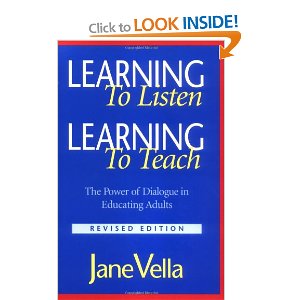Jane Vella’s, Learning to Listen, Learning to Teach, is written for both adult learners and teachers of adults. It has the primary assumption that dialogue is better than monologue for adult education. After all, with all the life experience that every adult brings to the classroom, both teacher and fellow student will benefit significantly by dialoguing with one another. This book is basically a presentation of Vella’s Twelve Principles for Effective Adult Learning scattered with case studies and anecdotes: (1) Needs assessment; (2) Safety; (3) Sound Relationships; (4) Sequence and Reinforcement; (5) Praxis; (6) Respect for Learners as Decision Makers; (7) Ideas, Feelings, and Actions; (8) Immediacy; (9) Clear Roles; (10) Teamwork; (11) Engagement; and (12) Accountability. Using these 12 principles, Vella teaches the reader how to teach less and make more room for learning.
Instead of viewing the teacher as the one with all the knowledge, and the student as the empty vessel ready to be filled, dialogue education presupposes that both teacher and student come with knowledge and information beneficial for one another. As a result, the teacher may not actually do much formal lecturing in a class. Instead, the teacher will design the course material in a way that allows him/her to present the learning activities and then get out of the way. In and throughout the learning activities, the teacher’s role is more of a resource, facilitator, and guide.
This book has been so influential to me that I cannot imagine resorting back to more of a monologue type of education. As a pastor, I am going to be applying the principles of this book to small groups, discipleship courses, and my preaching in every way possible.
I give this book 5 stars out of 5.
